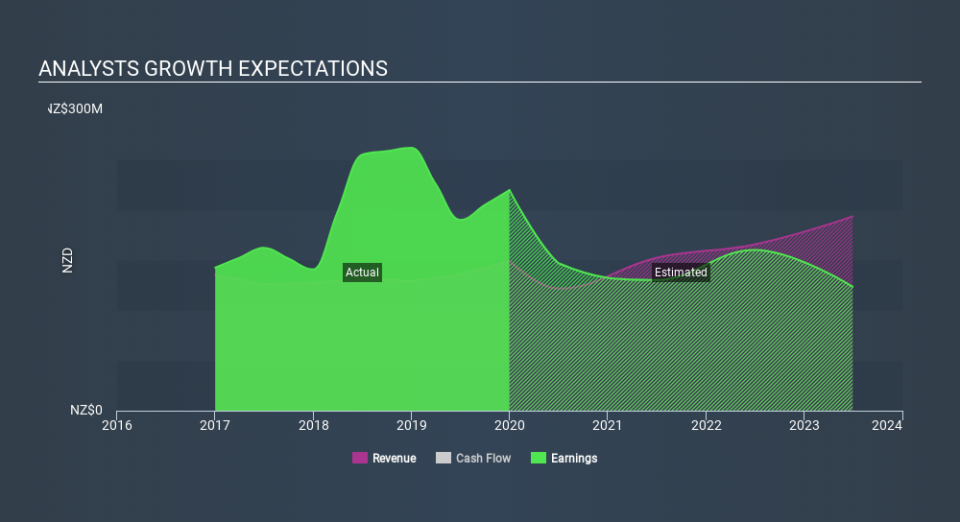Precinct Properties New Zealand Limited Just Beat Analyst Forecasts, And Analysts Have Been Updating Their Predictions

Precinct Properties New Zealand Limited (NZSE:PCT) just released its latest half-year results and things are looking bullish. It was a solid earnings report, with revenues and statutory earnings per share (EPS) both coming in strong. Revenues were 13% higher than analysts had forecast, at NZ$54m, while EPS were NZ$0.15 beating analyst models by 29%. This is an important time for investors, as they can track a company's performance in its report, look at what top analysts are forecasting for next year, and see if there has been any change to expectations for the business. We've gathered the most recent statutory forecasts to see whether analysts have changed their earnings models, following these results.
Check out our latest analysis for Precinct Properties New Zealand
Taking into account the latest results, the current consensus, from the six analysts covering Precinct Properties New Zealand, is for revenues of NZ$121.5m in 2020, which would reflect an uncomfortable 18% reduction in Precinct Properties New Zealand's sales over the past 12 months. Statutory earnings per share are expected to crater 34% to NZ$0.11 in the same period. Yet prior to the latest earnings, analysts had been forecasting revenues of NZ$122.9m and earnings per share (EPS) of NZ$0.11 in 2020. Analysts seem to have become more bullish on the business, judging by their new earnings per share estimates.
The consensus price target was unchanged at NZ$1.83, implying that the improved earnings outlook is not expected to have a long term impact on value creation for shareholders. There's another way to think about price targets though, and that's to look at the range of price targets put forward by analysts, because a wide range of estimates could suggest a diverse view on possible outcomes for the business. The most optimistic Precinct Properties New Zealand analyst has a price target of NZ$2.07 per share, while the most pessimistic values it at NZ$1.52. Still, with such a tight range of estimates, it suggests analysts have a pretty good idea of what they think the company is worth.
Further, we can compare these estimates to past performance, and see how Precinct Properties New Zealand forecasts compare to the wider market's forecast performance. One obvious concern is that although revenues are forecast to continue shrinking, the expected 18% decline next year is substantially more severe than the 4.9% annual decline over the past five years. Compare this with our data on other companies (with analyst coverage) in a similar industry, which in aggregate are forecast to see their revenue decline 3.8% per year. It seems clear that while revenues are expected to continue declining, analysts also expect the downturn to be more severe than that of the wider market.
The Bottom Line
The biggest takeaway for us from these new estimates is that the consensus upgraded its earnings per share estimates, showing a clear improvement in sentiment around Precinct Properties New Zealand's earnings potential next year. Fortunately, analysts also reconfirmed their revenue estimates, suggesting sales are tracking in line with expectations - although our data does suggest that Precinct Properties New Zealand's revenues are expected to perform worse than the wider market. The consensus price target held steady at NZ$1.83, with the latest estimates not enough to have an impact on analysts' estimated valuations.
With that in mind, we wouldn't be too quick to come to a conclusion on Precinct Properties New Zealand. Long-term earnings power is much more important than next year's profits. At Simply Wall St, we have a full range of analyst estimates for Precinct Properties New Zealand going out to 2023, and you can see them free on our platform here..
It might also be worth considering whether Precinct Properties New Zealand's debt load is appropriate, using our debt analysis tools on the Simply Wall St platform, here.
If you spot an error that warrants correction, please contact the editor at editorial-team@simplywallst.com. This article by Simply Wall St is general in nature. It does not constitute a recommendation to buy or sell any stock, and does not take account of your objectives, or your financial situation. Simply Wall St has no position in the stocks mentioned.
We aim to bring you long-term focused research analysis driven by fundamental data. Note that our analysis may not factor in the latest price-sensitive company announcements or qualitative material. Thank you for reading.


